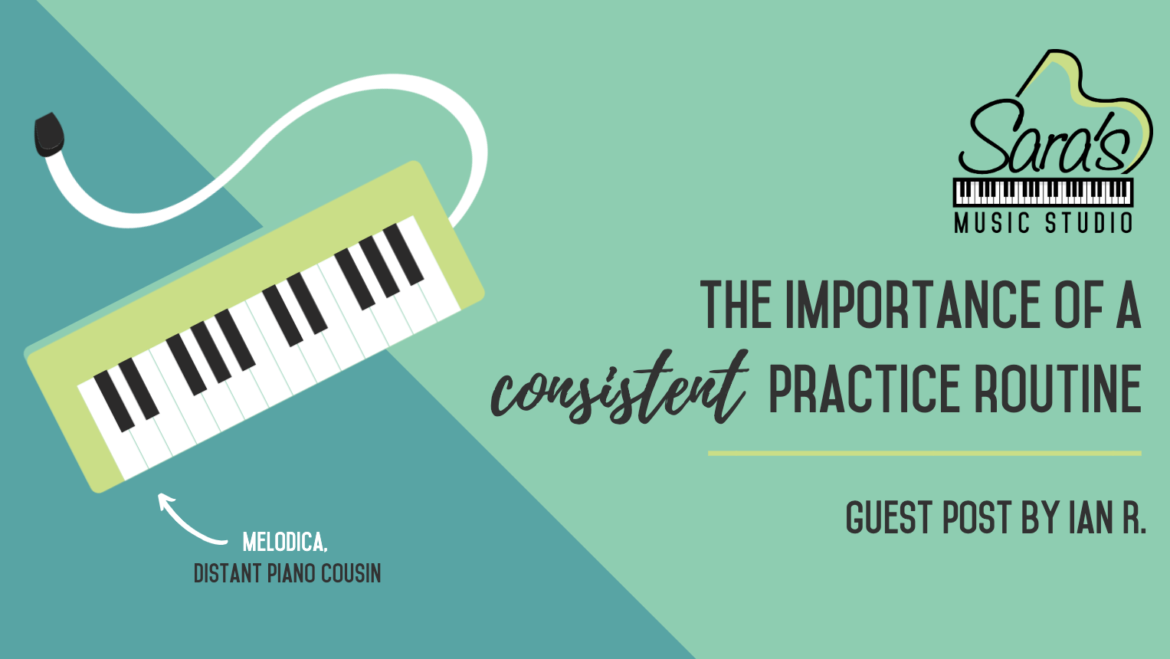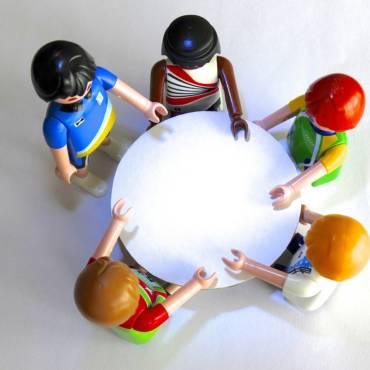The Importance of a Consistent Practice Routine
From Sara: Today’s guest post comes to you from a fellow musician, educator, and blogger, Ian R.. This would be a fabulous article to pass along to your studio clients! Hope you enjoy 🙂
Practice makes perfect, as the old saying goes. Musicians of all ages know that consistent, dedicated practice is the key to successfully learning to play any instrument. For many of us, our practice routine tends to be interrupted more often during the summer months. Vacations, warm weather encouraging us to be outdoors more, and schedule changes can all impact your piano practice program. Keeping your practice routine consistent is just as important in the summertime as it is during other seasons.
Does Practice Really Make Perfect?
While practicing your piano on a consistent schedule won’t necessarily make you a perfect musician, it is scientifically proven that it will definitely help to improve your performance. A study entitled “Deliberate Practice and Performance in Music, Games, Sports, Education and Professions: A Meta-Analysis,” conducted in 2014 by researchers from Rice University, Michigan State University, and Princeton University, found that practice really does boost the quality of instrument playing. Disciplined, deliberate practice improved performance in music by 21 percent compared to those who did not practice in a structured, steady manner.
So the old adage you’ve heard time and again from your music teachers over the years turns out to be valid. Practice does make better (not perfect, unless you’re a virtuoso or prodigy). Other factors come into play, of course. Consistent practice is the key to improving as a musician.
Why Must Practice Be Consistent?
In order to be effective, piano practice must be consistent. Consistency establishes a routine that serves a purpose; in this case, to learn to play the piano well.
Train Your Brain
Consistent practice will help you to retain information that you have learned during your lessons. When you have a practice session, your brain will process the information and remember it more efficiently the next time you practice. Practicing consistently actually helps to develop areas of your brain.
Train Your Muscles
Additionally, your muscle strength will build up over time with practice, and your hand-eye coordination will improve. This is commonly known as “muscle memory,” or by its scientific term, “procedural memory,” which means memory for skills. As your hands repeat the same movements over and over again, through practicing your piano, they will remember the notes and finger placement. Those movements will become automatic with repetition.
Establish Good Habits
Consistency in practicing your piano helps you to develop a routine. For many of us, just the thought of the word “routine” makes us groan. Developing a new routine can be boring and tiresome, but once you find a time that works for you, abiding by that practice routine is key. You must train yourself to stick to the routine no matter what – regardless of other things in life that try to intervene. When you go on vacation, it is not likely that you will have your piano handy to practice on a daily basis. But, when you return home, you should immediately start back up with your practice routine so that you don’t get out of the habit of practicing. (For the truly dedicated, however, there are ways to keep up with your practice routine on vacation!)
Establish Trust
Practicing consistently also establishes trust between student and teacher. If a student is practicing on a consistent basis, it will show when lesson time rolls around. The instructor can definitely tell which students have practiced and which have not. As students continue to improve from consistent practice, a trust will develop between the teacher and the student. The teacher will trust that the student is dedicated to improvement, and the student will trust that the teacher will validate their practice through praise. Consistent practice can help both students and their teachers avoid burnout.
Motivate Yourself to Keep Practicing
If you have established a piano practice routine and have stuck to it for a period of time, congratulations! You should reward yourself for your hard work and dedication. While your reward might not be the same as that of a younger child (candy or a sticker might not be enough for you!), think of something that means a lot to you or something you’ve been desiring for a while, and make that your reward.
Celebrate your accomplishment! Maybe a night out with a significant other is a good reward for you. Or buying that item of clothing you’ve really been wanting. Once you have developed your own piano practice routine, and have committed to it for a while, rewarding yourself for practicing is a great way to motivate yourself to keep it up!
Keep Challenging Yourself
As you carry on with your piano practice routine, keep it interesting by always continuing to challenge yourself. Place a journal near your piano and write down goals for each week’s practice sessions (or on a daily basis, if you prefer). Your goal for one day of piano practice, for example, might be to get the fingering figured out for the left hand of a particularly challenging piece of music.
Ensure to keep moving on to harder and harder musical pieces as well. Your piano teacher should be making sure that you do this, but whether you are taking lessons from a teacher or are teaching yourself, this is vitally important. You won’t remain interested in practicing if you keep practicing the same, easy pieces that are no longer a challenge for you. Make it harder for yourself, but not too hard too quickly. You don’t want to start hating and dreading your practice time!
 About The Author
About The Author
Ian R. is a life-long musician, educator, and the owner/editor of the popular music blogs ThrivePiano, DrumRadar, and BassGuitarGuide.





